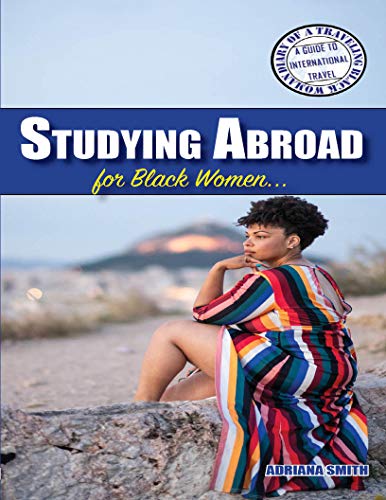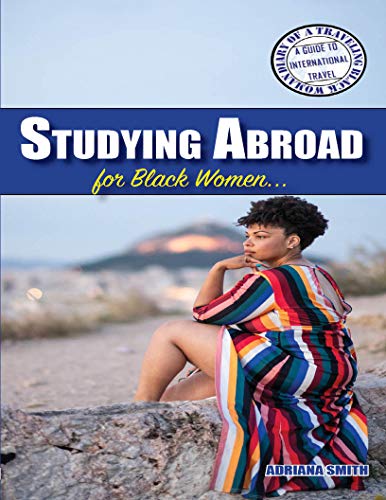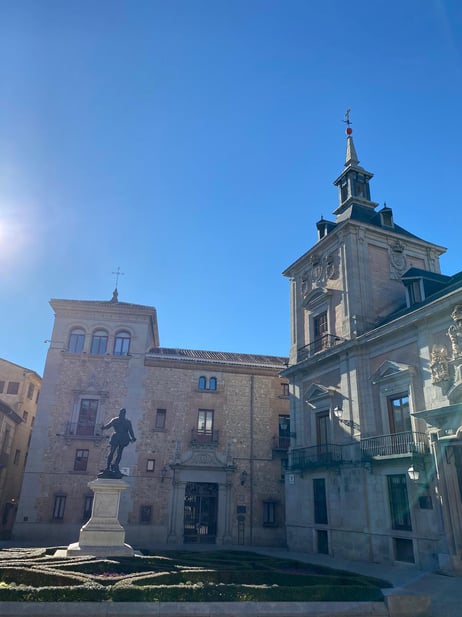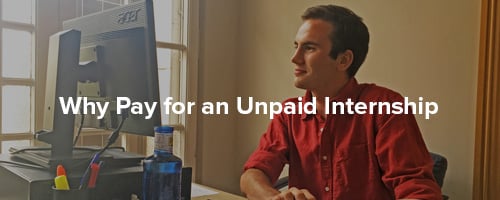Originally from Miami, Florida, Adriana Smith, an educator, author, and an AIFS Abroad University Relations Regional Director, was first introduced to international travel through a summer study abroad program in Spain.
Although her first few weeks were overwhelming, Adriana's time in Madrid helped her discover a deeper confidence, an unexpected professional path and inspired her to develop resources that support and encourage first-time, underrepresented college students to study abroad.
Adriana sat down to talk about her biggest influences, her advice for students and study abroad professionals and how her experiences abroad inspired her to write Studying Abroad for Black Women (Diary of a Traveling Black Woman: A Guide to International Travel) in hopes of helping others fulfill their dreams of traveling overseas.
1. You mention in your book that you are a first-generation college student who had not traveled internationally before you got to college, can you talk a little bit about your first time overseas and what prompted you to decide to go abroad in the first place?
Being from Florida, travel for me as a kid was to the beach. When I got to college, I didn't know that there was a bigger world out there. That might sound naive, but truly, my concept of the world was very, very small. During a class, an advisor came into my classroom to talk about a study abroad program in Spain, and I thought that sounded really cool. When class got out, I walked right back to my dorm room and applied.
Once I applied, I was like, what did I just do? My brain was catching up to my actions. I didn't know what I didn't know. I didn't know what it was like to be in a different country and in a country whose native language wasn't English. I had to navigate using the lens of a first-time traveler. But it was a blessing for me. It felt like an "Aha" moment. Of course, 2 days in, I was scared, and I wanted to go back home. I thought, this is for the birds. This is not what I thought it would be.
2. How did you overcome those first few weeks of being completely out of your comfort zone?
As each day went by, I got stronger. For six weeks, life was on a very intense scale, and there was a lot of growing up and learning I had to do. I had to problem solve, adapt, and humble myself. I had to allow the learning to happen around me. However, I came up, whether it was at the store, getting ice cream with friends, on the bus or at dinner with my home stay Señora. I realized that I needed to open myself and my mind up to what was happening. 5 weeks in, I realized, okay, this is getting easier. This is getting better. I think I can do this, and by the end of the program, I was like, Oh, my gosh! I have to go back abroad again.
3. Since that first program, you've had the opportunity to travel all around the world, including completing your master's degree back in Spain. From all the stories you've collected and places you have seen, what made you first decide to write about your experiences and use them as a way to help others?
I never thought or felt like I was going to become a writer, but I did an internship with Go Abroad in 2014 where we talked about creating programs for diverse students. It planted a seed in my head. In 2017, I decided to put a blog together to write about different stories and different topics around my own experience. When it came down to it, I was the only student of color on my first study abroad program, and I had lots of questions that I wanted to ask, but also didn't know what or who to ask, especially since no one looked like me. Also, I knew I wanted to help parents and families support their children. My mom didn't know about studying abroad. She didn't know how to help me. She didn't know what to expect. She just kind of left that to me because I was the student, and I was the one getting that information. So, as I began to write, I was looking to gather information for both students and also parents to use as a resource.
4. You describe Studying Abroad for Black Women as your "love story to Black Women and Black female college students", can you share a little more about the book and your process of writing it?
I knew that I wanted to create resources that focused on every aspect about studying abroad – from the very beginning, from interest to returning home. What brought me to writing the book was through my blog and through my online presence. I was approached by a publisher who suggested that I write a book about Black women studying abroad, and thought, that's a great idea because we don't have that kind of resource in the field. I took about 3 months to write it, and I wrote down everything I would have wanted to know before I studied abroad. I wanted to make sure I wrote it in a very digestible way, so that students don't feel overwhelmed. I took into consideration the Black women that I know who I am surrounded by and who I advised when I was working at an institution. I wanted to think about the conversations that we had internally and put it into a book. So, I start off with my own story to make it okay for others to share their own story and their hurdles, their struggles, and whatever they might be going through to let them know, even though what you are thinking may be true, you still can go abroad.
For me, it's pouring my heart into something, and making sure Black students are seen, and that they definitely feel heard, because in the book, I also talk about hair. You know, for a lot of Black women hair is something they wonder about. What do I do with my hair in x-country? Do I have to style my hair before I go there? Do I get my products there or can I get products shipped to me? And sometimes those conversations don't happen in an advising session, or in a group session, or in a pre-departure session. I made sure to put that in there, so they know that there are people thinking about them when they're making that decision to go abroad.
I also included the safety aspect of Black women in different countries, and how they might be treated. It was important for me to put that all in there. And that's why I call it a love story, because I love Black women and sometimes feel like they are misrepresented, stereotyped, and/or not seen. And I want them to know that they are seen.
5. The book also has a lot of blank space for reflection, how do you suggest readers use this as a tool?
I am an introvert, I reflect all the time, but there is a space in the book to think through the entire process. Imagine there's a student at school they're going through the application process, but they find something difficult about it. The book has a place they can write and refer to when they go to an advisor, or if they decide to create their own program or create their own business. It's something that they wrote down that they can reflect on from their own experience and learn from personally or professionally. I also want to suggest that for any female Black college students to take ownership over their own course and journey and always look back to see how they can help other people, other Black college students in the future. Help yourself, but also help others.
6. It is often thought of that Black people have not historically studied, worked, or traveled abroad. However, we know this isn't true when we look at the lives of ancestors like WEB DuBois, Josephine Baker, Mary McLeod Bethune, Katherine Dunham. Are there any ancestors or elders who have inspired you to go abroad?
When I was young, my mom and my grandma would tell me about my great grandfather, Clarence Mitchell. He would travel back and forth between Miami and Georgia. Just to hear them talk about how he was as a young man, he was very, very strong. He didn't take any crap from anybody. He protected his family. He protected his finances, but he was also very adamant about his movements in life and in business. My grandmother, too, was very strong willed. And while they never traveled internationally, when it comes down to the soft skills, they had the traits that help people go abroad. You know, being strong willed, being persistent and really being able to navigate difficult situations. My great-grandfather, I think he was born in 1901. My grandmother was born in 1930. Imagine all the history that they've gone through.
Also, when I was in high school, I played Madam CJ Walker. It's significant because I got to play an American hero, entrepreneur, a trailblazer. It instilled in me those traits that later lead to me going abroad. It was her foresight and perception in where she wanted to go in her business and in life.
Lastly, I would say, Bessie Coleman who was the first African American woman to earn a pilot's license. For me, it's not about being the first of anything, but more so about the hurdles that one has to go through in order to get to a destination. For her, to overcome all she had to, to fly a plane, to become a pilot. For me, she's one of the people that I want to forever remember as a trailblazer in her own right. It comes down to the qualities, not necessarily the actions, but the qualities that allow you to blaze your own trail and make your own dreams come true. And I think of all the individuals I have mentioned who have made their dreams come true in one way or another.
7. Do you have any pieces of advice you would give to professionals in the International Education field?
I want all advisors to know that there are resources out there for them to learn more about their students. It's not the student's job to educate you on who they are. As advisors, we sometimes get comfortable in what we know–the policies, the processes, the locations, but we end our education there. But there is always something to learn. Our students are changing every semester. We have to keep learning. Take an extra moment to read a book or watch a TED talk so we can add to the tools we give our students. Make sure your students are seen and heard. Right now, they are trailblazers in their own right.
Studying Abroad for Black Women (Diary of a Traveling Black Woman: A Guide to International Travel) can be purchased here.























